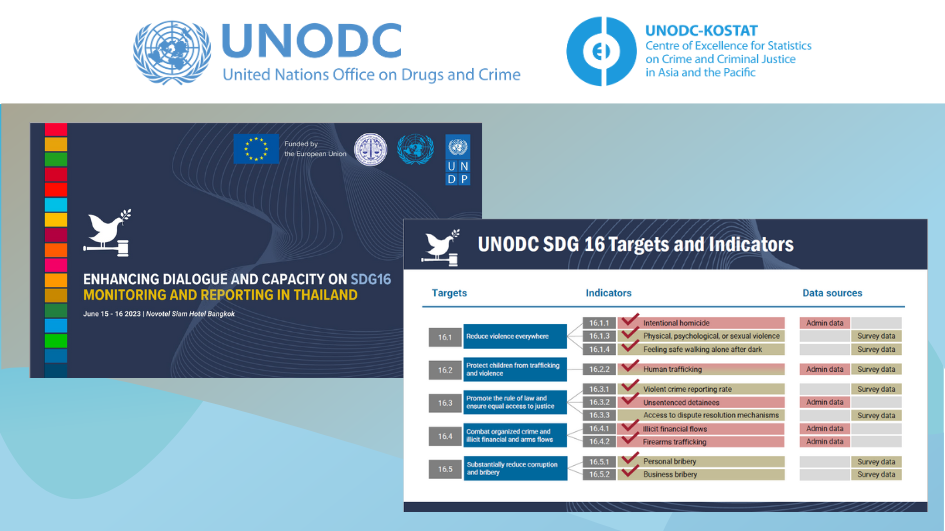
Bangkok (Thailand) & Online, 15-16 June 2023 – The CoE participated in the Workshop on Building Capacity and Enhancing Dialogue SDG 16 Monitoring and Reporting in Thailand and delivered a presentation on how to measure ten SDG 16 indicators, along with pertinent methodological guidelines and tools developed by UNODC.
The workshop was co-organized by the Office of Justice Affairs of Thailand and the United Nations Development Programme (UNDP), spanning two days, with the aim of enhancing awareness, strengthening capacity, and discussing strategies to address SDG 16 data gaps in Thailand. Custodian agencies of SDG 16 indicators, including UNODC, UNDP, WHO, UNFPA, UNESCO, UNICEF, OHCHR, World Bank and ESCAP, as well as national counterparts from various government institutions, participated in person or online.
The workshop commenced with an opening session led by Mr. Nithat Sangwattana, Director of Division of Policy and Coordination of Justice Department at the Office of Justice Affairs, followed by an overview of the SDG 16 progress in Thailand by ESCAP. The Ministry of Justice then presented current data availability and data sources in Thailand. Welcoming remarks were delivered by Lieutenant Colonel Dr. Pongthorn Thanyasiri, Director General of the Office of Justice Affairs, Sara Rezoagli, Deputy Head of the European Union Delegation to Thailand, and Gita Sabharwal, UN Resident Coordinator to Thailand.
On the first day, UNDP introduced the SDG 16 Survey Initiative, which is a tool developed by UNODC, UNDP and OHCHR that enables Member States to produce data for measuring survey-based SDG 16 indicators. The benefits of this initiative were discussed, highlighting the value of an internationally standardized methodology for monitoring SDG 16.
The CoE presented a comprehensive overview of the ten SDG 16 indicators for which UNODC has custodianship: SDG 16.1.1 Intentional Homicide, SDG 16.1.3 Prevalence of violence, SDG 16.1.4 Feeling of safety, SDG 16.2.2 Human trafficking, SDG 16.3.1 Reporting rate of violence, SDG 16.3.2 Unsentenced detainees, SDG 16.4.1 Illicit financial flows, SDG 16.4.2 Firearms trafficking, SDG 16.5.1 Bribery among population, SDG 16.5.2 Bribery among businesses.
The presentation not only explained the definition and rationale behind each indicator but also introduced a wide range of available methodological tools that Member States can utilize, such as the International Classification of Crime for Statistical Purposes (ICCS), Manuals on Corruption and Victimization Surveys. Finally, the monitoring mechanism of these indicators, through the United Nations Crimes Trend Surveys (UN-CTS), was also presented.
The meeting successfully achieved its objectives of promoting dialogue and cooperation among government agencies in Thailand and UN entities. The CoE will continue providing support on SDG 16 to Member States in Asia and the Pacific together with other UN agencies.
Further information on the CoE can be found here and Twitter @CoE_UNODC.